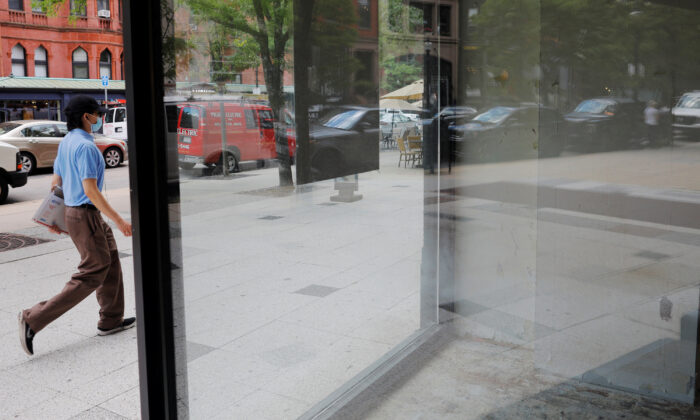The number of Americans filing jobless claims fell below one million for the first time since the height of the pandemic lockdowns in March, when weekly filings surged to an all-time record high of nearly seven million.
The number of workers filing initial unemployment claims come in at 963,000 for the week ending Aug. 8, the Labor Department said in a release (pdf) Thursday. This is a drop of 228,000 from the previous week and the first time in over 20 weeks that this number fell below one million.
Claims peaked at a record 6.867 million in mid-March, as the pandemic-driven lockdowns delivered a historic blow to the U.S. economy. In the second quarter of this year, American economic output fell at its steepest pace since the Great Depression.

Economist polled by Reuters expected 1.12 million weekly claims, so the news comes as a surprise to the upside. Markets met the news with tepid enthusiasm, however, with the benchmark S&P 500 and Dow Jones dipping at open on Thursday, as the drop in weekly claims may be driven by the expiration of the $600-per-week pandemic jobless supplement that likely discouraged some from filing claims.
After congressional and White House negotiators failed to reach a deal on the fifth stimulus package, which was to include some form of an extension to the jobless supplement,聽President Donald Trump on Saturday signed an executive order prolonging the weekly payout, but reducing it to $400. Republicans have repeatedly urged a downscaling of the $600-a-week payment, arguing that it is so generous as to discourage many people from seeking work, a form of labor market distortion that harms small businesses the most.
 Workers painting the Julien Dubuque Bridge along U.S. 20 in Dubuque, Iowa, on Aug. 24, 2015. (Dave Kettering/Telegraph Herald via AP)
Workers painting the Julien Dubuque Bridge along U.S. 20 in Dubuque, Iowa, on Aug. 24, 2015. (Dave Kettering/Telegraph Herald via AP)Thursday’s jobless claims report also showed that the number of people receiving benefits after an initial week of aid, a metric known as continuing claims, fell from 16.09 million to 15.49 million in the week ending Aug. 1. Another bright spot in the report was that the total number of people receiving unemployment in all programs dropped by over 3 million in the week ending July 25, coming in at 28.26 million. In the comparable week in 2019, there were 1.69 million people receiving unemployment benefits, a stark difference that shows the depth of the economic fallout.
The government reported last week that the U.S. economy added 1.76 million jobs in July, bringing the unemployment rate down to 10.2 percent.聽While a better-than-expected number, July鈥檚 job gains fell far short of June鈥檚 4.8 million increase and May鈥檚 2.7 million gain, and indicates that only around 40 percent of the jobs lost due to pandemic-driven shutdowns have come back.
The upward dynamic of labor market recovery is widely seen as straining against a surge in COVID-19 infections in parts of the country. Boston Federal Reserve president Eric Rosengren said Wednesday that as long as the potentially deadly bug poses a significant threat to Americans’ health, any economic rebound will be limited.
Since March, Congress has authorized about $3.6 trillion in new spending to help American families and businesses weather the fallout, with economists widely crediting the relief for minimizing the damage to the U.S. economy.
Focus News: Weekly Jobless Claims Fall Below 1 Million For First Time Since March Lockdowns
White House Seeking to Cut Capital Gains Tax via Congress: Kudlow
